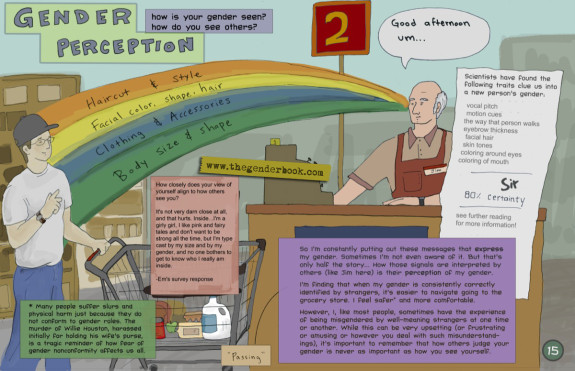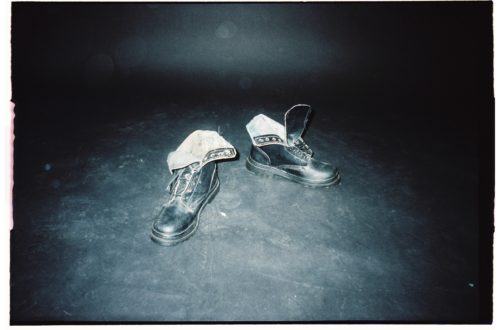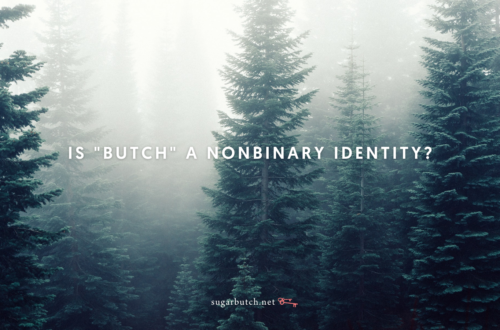This essay, as with pretty much everything I write, is purely my own experience and my best understanding. I’m not trying to tell you what you should or shouldn’t care about, just sharing what my process has been around gender perception and genderqueerness.
For a little more than three years, I’ve been using they/them/theirs/themself pronouns. Notice that I’m avoiding saying that I “prefer” they/them pronouns, because, as many gender activists have been discussing lately, it’s not exactly a “preference.” I prefer green grapes to red grapes, I prefer almond milk to soy milk. But the accurate pronoun for my gender identity is they/them/theirs/themself.
Using a pronoun outside of the standard gender binary is a lot of work on a daily basis. Sure, I do spend most of my time inside of genderqueer and trans communities, and many of those folks are super smart about gender and either ask about pronouns or already know mine, and like to call people what they like to be called. I’m surprised how good it makes me feel when people get my pronouns right, actually. And because often I don’t hear people talking about me—which is the only time they really refer to me in the third person—I don’t hear it very often. The recent Sweet & Rough blog tour is a thrilling example: it pretty much brought tears to my eyes every time the folks on the tour referred to me using they and them. My inner kid—you know, the one who thinks I’ll never be understood or seen or valued—gets all hopeful and touched, and feels vulnerable and seen. I think things like, “Really? You see me like that?” and “You get it! Omg you get it!” and “Are you just humoring me? Or do you really get it?” and “Ergh, I hope it isn’t too much trouble for you to understand that!” and … I feel such relief. My shoulders relax and my body lets go of just a little bit of the tension I always carry.
Am I mad at the system? Fuck yes. Am I working on changing it? Absolutely. Are these moments microagressions? Fuck yes. Do the little needles that are microagressions add up, becoming a seeping wound by the end of any given day? Yeah. Could I just take my toys and go home and become a hermit to avoid dealing with this? Yeah. And sometimes I do, and sometimes I really want to.
But after three years of really claiming the identity of genderqueer … honestly? Being misgendered doesn’t bother me as much anymore.
I rarely correct the pronouns people use for me. I tell them if they ask, absolutely. I have lots of conversations about why they/them is the best choice for me, why I use it rather than ze/hir or other gender neutral pronouns, or why it’s grammatically correct despite the rules saying it is plural.
(Short version: I believe language is fluid, and our uses of it change over the years. I find it to be the least awkward in speech and written flow because we’re already used to it as a pronoun in other contexts. If people want to prioritize holding tight to grammar rules instead of smashing the gender binary and evolving our language to reflect the changes and include thousands of folks who are in-betweeners, well then, I guess I have to reevaluate just how close I want to be with that person. As much as I get a boner for really strict grammarians, to see the rules as so rigid that they cannot be malleable to include folks who are marginalized out of our language is not the kind of poet activist I want to be.)
When all those folks out there in the world out there misgender me, calling me sir or ma’am or ladies or she or bro or miss or whatever they might be using, I let it go. It might prick me for a moment, so I store that away as fuel for my activism, and then I try to remember: I don’t need their validation.
Because I have so much validation from my close, inner circle communities, and even validation from broader queer worlds, and hell, from more and more people even outside of my inner circle, I don’t need the validation of the bus driver or the guy at the deli counter or the barista at the coffee shop. I just don’t. They don’t see me as genderqueer? Okay, whatever. Or hey, maybe they DO see me as genderqueer, but they don’t really have language and words for it, and even though they’re feeling that hey-you’re-not-quite-the-usual-kind-of-person-with-breasts thing, it doesn’t occur to them that that means not to use the term “lady” to address me. I am interested in doing more activism to educate folks in service professions to use words that aren’t so starkly gendered to address people who are in-between. (I even have a super secret project in the works about this.)
But I don’t need them to understand my gender in order for my gender to be real, seen, valid, and honored in the world.
It’s the difference I suppose between “gender identity” and “gender perception.” It’s only in the last 100 years that the concept of one’s “sex” has been divided into “sex and gender.” As gender theory has evolved, there are many words within the concept of “gender” and what it is. Gender identity is generally (I mistyped it as “genderally”) the identity that I see myself as. For example, I see myself as genderqueer, trans, and butch. Gender expression is usually how you’re expressing your gender verbally and with energy, and gender presentation is usually how you have decorated your body and the visual presentation of it. For me, that’s usually butch and masculine.
Gender perception is how others see your gender.

“Gender Perception” page from The Gender Book
I do understand that gender perception is a serious source of distress for many folks, feeling that if the world doesn’t see and reflect that I am a certain gender, then I am not that gender. It can be devastating to not be recognized, I do understand that. But for whatever reason, it’s not that important to me.
Or wait—let me rephrase that. It’s very, very important to me to be seen and recognized and understood by my communities and my lovers and my family, and sometimes it takes a lot of work to educate and inform and correct and encourage folks to do so. But it’s not that important to me that the world at large understand and get my gender identity and pronouns right this minute. I just understand that the majority of people haven’t deconstructed the gender binary in a way where they can even see beyond it.
Remember that part in the HBO series Six Feet Under, where Claire, in art school, is trying to “break her eye open,” to see new perspectives and outside of her habits? Most people haven’t broken their eyes open to see more genders, yet.
I want to encourage that process of breaking your eye open to see more genders for everyone, not just within my communities of radical sex and gender minorities. But the frustration I feel when the larger society doesn’t get my gender stems from my unrealistic expectation. In a way, it’s just arguing with reality.
I’d love to figure out a way to address those misgenderings more easily in the moment, but usually it takes more than just, “hey, don’t call me lady,” for someone’s eyes to break open.
Right now, I can’t change this thing—this problem that the larger culture hasn’t broken their eyes open to more genders yet. I’m doing what I can, and being part of movements that are trying to get that culture broken open, and it is happening right now, the effects are huge and frequent. I can’t change this thing, but I can change my relationship to this thing. I can choose to funnel the pinpricks of not-belonging into more activism and work. I can keep encouraging people to break their eyes open to myriad genders, and I can look to my communities as a source of my validation and intimacy around my gender identity.
Illustration of “Gender Perception” by The Gender Book, reprinted with permission




This is a hard place for me. I personally dislike the usage of their/them/they for myself. Yet people either ask me my preference or if they know me use the female pronouns. Granted, depending on the day and WHO is using the female I can get pretty irritated. On the flip side if someone asks what I prefer I go through a rather confusing explanation that I relate as being more male but am comfortable with them using what they are comfortable with. I think this really leaves the door open for folks to be in a space that they are comfortable with which will in turn make our relationship more comfortable. That is true for some of my friends, yet I find that it seems to cause me a fair amount of grief with some. What I intend to be a nice balance of them being respectful enough to ask what I want and me being respectful enough to reply with do what makes you comfortable many times ends up with folks assuming I’m not serious about being in the grey area and saying as much. What it boils down to is people being uncomfortable with me being outside the norm. If I was fully trans in the sense of taking on a male name and using male hormones, people would still be more comfortable with the black and gray answer of that is a boy. Me being flexible in the gray area just causes grief. I don’t want to be a neutral pronoun, I want to be a sexual being that their/them doesn’t represent but have no idea how to fix this.
L.— That’s so interesting, what you said: “I don’t want to be a neutral pronoun, I want to be a sexual being.” I definitely see they/them as having a sexual charge, but it makes sense that because it doesn’t have the gender charge, the sexuality doesn’t seem like it’s turned up. I will have to ponder that idea a bit more … and perhaps write more smut with they/them pronouns. :D
Dear Mr Sexsmith,
Thank you very much for this post, and for the tremendously important work you do. I am a (properly credentialed) pedant, and I want to assure you and all your readers that using the plural pronouns them/they/their in cases where the conventionally binary gender of the subject is indeterminate or mixed was entirely acceptable in English until well into the nineteenth century, so we’ve had less than 150 years of this singular-pronoun-or-bust nonsense. People who reject it on grammar grounds are analogous to those who believe marriage has ‘always been between a man and a woman’, ignoring the well-documented practices of same-sex marriages in, for example, Medieval Europe. Which is to say that adopting plural pronouns for personal use seems not only entirely apposite – and frankly, it shouldn’t be anyone else’s business what pronouns you choose for yourself – but also of historical provenance and grammatical logic.
I hope you were serious about the boner.
^^^L: AMEN!! It’s been causing me unbelievable stress lately. I started going by male pronouns about a year ago, but dislike it in great part because rather than being a more accurate description of my butch identity as I naively expected, it’s made me invisible. I already passed all of the time, but at least when I went by she there would be that moment of recognition as some kind of queer when the person in question heard it used. Now I’m just a guy, which is the one thing I don’t want.
Gender pronouns.
Greetings! (<- a really handy way to avoid using gender-specific stuff). I'm having to learn my way around gender-squishy pronouns, especially since my son's partner is themselves gender-fluid and prefers "them" and "they", and another friend is "zie" and "hir" preferring.
So when one is approaching a table of a mix of people of a mix of genders, is there a preferred group-word to use? Should I just use "Greetings" and not try to qualify it? Is "Hello, people" ok? It's a whole new world, and I don't want to alienate people with my ignorance if I can avoid it.
I think “Greetings” is great. “Hello, people,” is a little awkward, but “Hey folks!” or “How are y’all doing?” or “Hi everyone” all sound less awkward to me. Thanks for being thoughtful! :)
They/Them is a plural set of pronouns. I don’t care how genderfluid you are; you are still an individual. You are not a group unto yourself. You are one person with many modes of expression. I will not call you them, it’s disingenuous, and disrespectful. I will use the pronouns that reflect the gender you present, in real time. Present as male, I will refer to you as “him”. Present as female, I will refer to you as “her”. The choice is yours, and subject to change. I will not however, refer to you, the single person, in any form of plural. We take no amusement in that.
There is a significant gender activist community who has made they/them an option for individuals to use. If you interact with genderqueer folks and they make this specific request, and you still refuse to honor their request, and instead decide that YOU get to choose how to address that person, as you stated—”Present as male, I will refer to you as “him”. Present as female, I will refer to you as “her”.”—then personally I would see you as a jerk who is completely insensitive to gender, and chose to interact with you as little as possible.
You don’t get to determine what is “disingenuous and disrespectful” for other people. If they are telling you that addressing them one way is precisely what would be respectful, you don’t get to decide otherwise.
I urge you to reconsider your position on this, if you want to have any genderqueer friends.
Regarding the singular “they”, Ursula Le Guin wrote this back in 1988: “I still dislike invented pronouns, but now dislike them less than the so-called generic pronouns he/him/his, which does in fact exclude women from discourse; and which was an invention of male grammarians, for until the sixteenth century the English generic singular pronoun was they/them/their, as it still is in English and American colloquial speech. It should be restored to the written language and let the pedants and pundits squeak and gibber in the streets.”
Is this supposed to be a joke? I mean, given the plural ‘we’ in the last sentence?
I have serious concerns about how this plays out *in a workplace* where the person who isn’t using the correct honorific is *working* and, usually, *serving* you. Many people in my queer community use this example: the person who is serving them is not attentive enough to the endless and glorious variants of their gender. While there is a larger issue here, the attrition of the queer critique of capitalism, of servile jobs, etc, the smaller, more personal issue, is often even more surprising. I have seen my queer friends behave in both condescending (I know you are serving 18 tables, but please let me educate you about my honorific) and/or retributive (docking a tip, or worse, contacting a manager). Surely context is important, and is the way to build allies to lecture them in the middle of their surveilled labor, or are there other, more productive ways to build solidarity? Attend a picket line, leave a flyer for a queer event, build cross-gender activism in your community, for example. My question is thusly: why do these illustrative scenes often center on critiquing people at the very scene of exploitation?
Hey cahun, thanks for your comment.
I agree that I’ve seen many confrontations by queers that are unkind, condescending, and shaming, and that makes me really uncomfortable. I don’t have much capitalist theory under my belt, but from my understanding of what you’re saying, it seems unfair to criticize a worker for doing pretty much exactly what they’ve been trained to do. Particularly in the example of a server at a restaurant, they are often either explicitly trained to address everyone as “ladies and gentlemen” or they are keenly aware of the restaurant and service culture which thinks that that is a formal and polite way to address everyone.
I don’t think we should shame or punish servers for misgendering, I think we should be generous and see it as a reality of the larger culture, and funnel whatever frustration into activism. I do think those are possible teaching moments, but that should be done with a) as much generosity as possible, b) awareness that a stranger has little or no investment in your gender, c) picking and choosing your battles consciously.
So your question, I’m interpreting as: Why do these scenes center on critiquing people at their work? Very very often I think the ways gendered bodies encounter the general public is through the service industries, and a few key other institutions (education, health care). So they center there because that is the most common place for that to happen.
But generally I think I agree with you, that we should be kinder to folks who are working. And, I think “I’m just doing my job” is also a kind of shitty excuse for someone to be perpetuating microagressions in ways that make genderqueer, queer, and trans folks feel assaulted all day every day.
This is a fascinating and awesome post, but I’m puzzled by the implication that “they” pronouns are the one true way of “of smashing the gender binary and evolving our language to reflect the changes and include thousands of folks who are in-betweeners.” One of the reasons I prefer ze/hir is that to me those (or “the x ones”) feel like a much more direct and deliberate attack on binary English as we were taught it growing up than “they,” which is much easier for the eye to skim over in writing and is used in speaking all the time by people who don’t mean to communicate anything about gender, they just aren’t grammar nerds.
I’m not suggesting that it’s ever ok to refuse to call someone what they [etc.!] ask to be called, or to argue that what you’ve chosen for yourself on this very personal question is “wrong” (again, that would be rude, and is also not what I mean), only that IMHO the arguments you’re making for “they” over other gender-neutral pronoun options read more like arguments for gender-neutral pronouns in general.
You’re right, I think—perhaps my writing was a bit unclear here. I’m not necessarily trying to make an argument for “they” over other gender-neutral pronoun options, so you’re right that it reads more like arguments for gender-neutral pronoun options in general.
As for why to use they as opposed to others like ze/hir … for the most part, I just like “they” better, for myself, and I think the decision is personal and how someone feels best being addressed. There are some reasons I personally like “they” better, I suppose, and I’ll give that some thought and see if I can articulate it.
I like what you said about how it’s a deliberate attack on English as we were taught growing up, that’s a good point. Thanks for your thoughts.
Re: they as singular. Long before I ever heard of genderqueer or transgender and other pronouns, I used they as singular when talking about someone where it wasn’t clear what gender they are..
And nice Billy… ignorance at its best.
Nev
ditto!
do you have any suggestions – personal, or references to resources – as a writer for how to use “they/them” with clarity? my spouse uses ‘they’ and i have found that (i am slow and stupid with change, but) it is not terribly difficult to use in speech, but when i write about them i always feel as though the linguistic norm that “they” is plural is making my writing confusing. like folks are seeing “they” and going, “wait. did i miss something? who else?” is that unavoidable? do you have any thoughts?